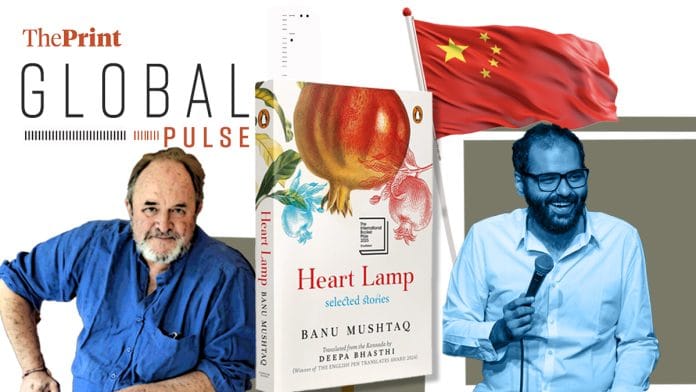New Delhi: In an exciting first, a book of short stories—Heart Lamp by Banu Mushtaq, translated by Deepa Bhasthi—has won the 2025 International Booker Prize, reports The New York Times.
Set in Karnataka, the collection explores themes of patriarchy and resilience.
Mushtaq, 77, said in an interview that her stories were about women, how religion, society and politics demand unquestioning obedience from them, and in doing so, inflict inhumane cruelty upon them, turning them into subordinates, NYT writes.
In another article, NYT looks at how the “reported success of Chinese-made fighter jets and air-to-air missiles” in the India-Pakistan conflict is “stoking a sense of pride” in China, with analysts now comparing Chinese military systems to those of the US.
“The Chinese military’s lack of real-world combat experience—it has not fought a war in more than 40 years—is a longstanding source of concern for some in Beijing. But China’s leader, Xi Jinping, has made modernising the military a priority. China has increased its defence spending even as economic growth has slowed, and it is now the fourth-largest arms exporter globally,” it reads.
Hu Xijin, former editor-in-chief of Chinese-state-run Global Times, termed it “the most convincing appearance of the Chinese weapon system on the world stage”.
Meanwhile, in Financial Times, Veena Venugopal writes about how making jokes in India, occasionally referred to as “the republic of hurt feelings”, is “serious business”.
As the stand-up comedy scene comes into its own, the number of complaints against comedians—like Kunal Kamra—have increased manifold. Wading into politics has become “dangerous territory”.
“There is no ambiguity now,” a comedian tells the FT. “Till a few years ago, you could say, ‘let me test the waters and see how this joke will land’. But now, everybody—comedians and the entire ecosystem—knows that if things go wrong, anything can happen.”
Part of its WorldView newsletter, The Washington Post has an interview with William Dalrymple, author of The Golden Road: How Ancient India Transformed the World, a historical account of the Silk Road which places Ancient India squarely at the centre of global politics and society.
“There is a whole world of Indian soft power where the dots have not been joined. And it’s odd, because there’s so much great scholarship coming out of Indian universities, but often it’s siloed. And there’s a whole world of Indian learning and knowledge which people in the West simply don’t know about,” Dalrymple tells Ishaan Tharoor.
(Edited by Nida Fatima Siddiqui)
Also Read: Global media on China’s balancing act & why India ‘won’t benefit’ from further combat with Pakistan






